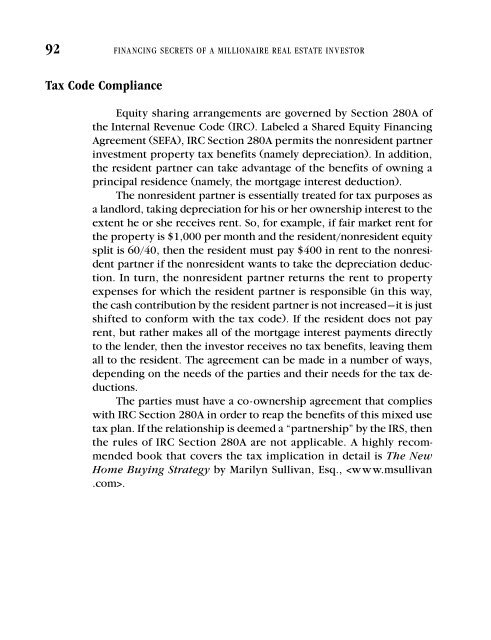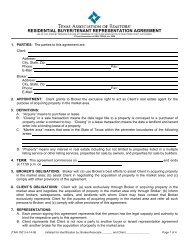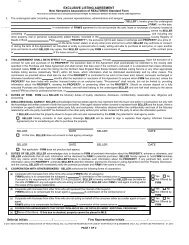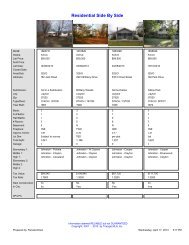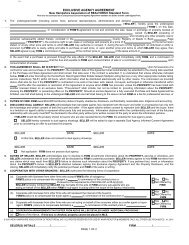financing secrets of a millionaire real estate investor.pdf
financing secrets of a millionaire real estate investor.pdf
financing secrets of a millionaire real estate investor.pdf
You also want an ePaper? Increase the reach of your titles
YUMPU automatically turns print PDFs into web optimized ePapers that Google loves.
92 FINANCING SECRETS OF A MILLIONAIRE REAL ESTATE INVESTOR<br />
Tax Code Compliance<br />
Equity sharing arrangements are governed by Section 280A <strong>of</strong><br />
the Internal Revenue Code (IRC). Labeled a Shared Equity Financing<br />
Agreement (SEFA), IRC Section 280A permits the nonresident partner<br />
investment property tax benefits (namely depreciation). In addition,<br />
the resident partner can take advantage <strong>of</strong> the benefits <strong>of</strong> owning a<br />
principal residence (namely, the mortgage interest deduction).<br />
The nonresident partner is essentially treated for tax purposes as<br />
a landlord, taking depreciation for his or her ownership interest to the<br />
extent he or she receives rent. So, for example, if fair market rent for<br />
the property is $1,000 per month and the resident/nonresident equity<br />
split is 60/40, then the resident must pay $400 in rent to the nonresident<br />
partner if the nonresident wants to take the depreciation deduction.<br />
In turn, the nonresident partner returns the rent to property<br />
expenses for which the resident partner is responsible (in this way,<br />
the cash contribution by the resident partner is not increased—it is just<br />
shifted to conform with the tax code). If the resident does not pay<br />
rent, but rather makes all <strong>of</strong> the mortgage interest payments directly<br />
to the lender, then the <strong>investor</strong> receives no tax benefits, leaving them<br />
all to the resident. The agreement can be made in a number <strong>of</strong> ways,<br />
depending on the needs <strong>of</strong> the parties and their needs for the tax deductions.<br />
The parties must have a co-ownership agreement that complies<br />
with IRC Section 280A in order to reap the benefits <strong>of</strong> this mixed use<br />
tax plan. If the relationship is deemed a “partnership” by the IRS, then<br />
the rules <strong>of</strong> IRC Section 280A are not applicable. A highly recommended<br />
book that covers the tax implication in detail is The New<br />
Home Buying Strategy by Marilyn Sullivan, Esq., .


